Lemon Introduction
Supplying adequate nutrition is crucial for healthy lemon plant development and an abundant yield of lemon fruits. Choosing the best fertilizer may greatly increase the health of plants. Healthy lemon trees are wonderful additions to gardens and orchards because of their fragrant blooms and pleasantly sour fruits, which are enhanced by fertilizer. Fruit quality and size should be improved by selecting the right fertilizer content and timing.
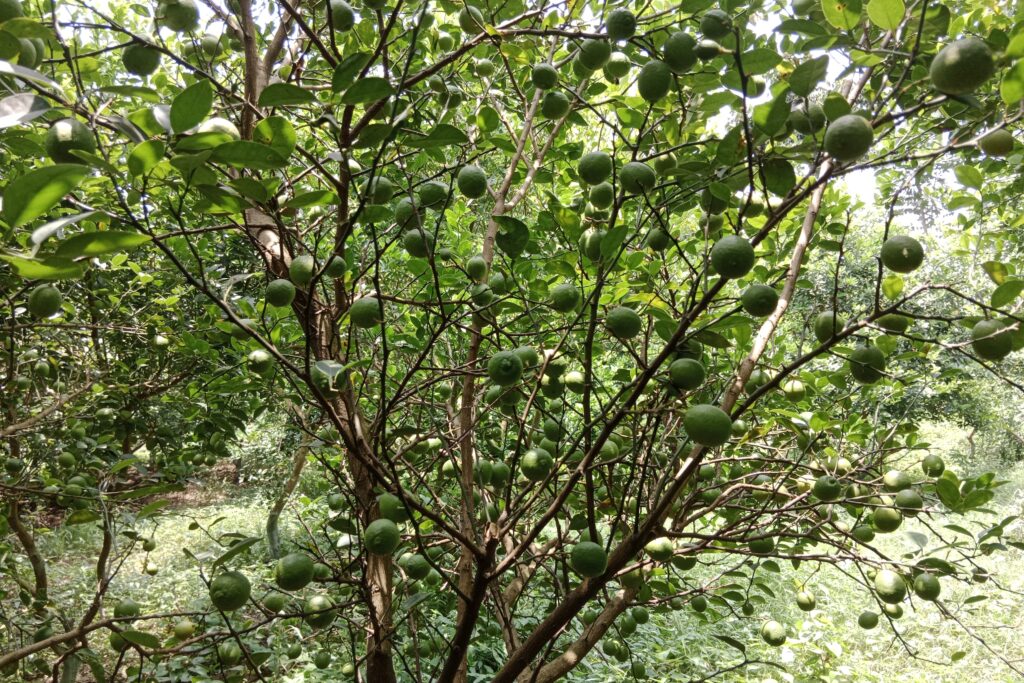
As only a small portion of flowers (1-2%) and often less than 1%, are required for an economically viable crop, hence no worries over flower droplets on citrus trees. But to stop more flowers from falling, you need to give the orchard the nutrients it needs as per the video, keep it moist enough during flowering, and take proactive measures to get rid of any pest and disease infestations before flowers appear. These measures collectively contribute to ensuring optimal fruit production and minimizing potential issues with citrus tree flower drops.
Best Fertilizers for Healthy Lemon Plants.
Choosing the right lemon fertilizer might be difficult, even though most people understand the basic principles of growing lemon trees. A significant amount of nitrogen is usually present in the best fertilizer for healthy lemon plants. Interestingly, potassium and phosphorus are the nutrients that increase fruit size the most. It is important to remember that higher potassium and lower nitrogen rates tend to correspond with larger fruit sizes. On the other hand, excessively high or low phosphorus rates hurt fruit size, resulting in a reduction in overall fruit size. The following provides information on the top seven fertilizers for healthy lemon trees:
Nitrogen
Since nitrogen is an essential part of chlorophyll, which helps in photosynthesis, lemon plants need nitrogen to survive. It increases overall plant vigor, promotes vegetative development, and supports lush, green foliage, and makes a healthy lemon plant. In addition, nitrogen is necessary for synthesizing proteins, enzymes, and healthy leaves, stems, and fruit on lemon plants. Fertilizers such as ammonium sulfate and urea are typically used to supply nitrogen.
Phosphorus
In lemon plants, phosphorus is essential for root development, energy transfer, and the production of flowers and fruits. It is necessary for a good crop of healthy lemons because it promotes nutrient uptake, supports photosynthesis, and increases overall plant growth and vigor. Fertilizers such as ammonium phosphate and DAP are typically used to supply phosphorus.
Potassium
Potassium is another lemon fertilizer that has a greater need compared to oranges, necessitating recommended potassium rates that are 25% higher than nitrogen rates for achieving the best possible lemon yield. Fertilizers such as Muriate of Potash (MOP) supply potassium.
Zinc Sulphate
Adequate zinc levels in plants enhance photosynthesis, nucleic acid metabolism, and protein biosynthesis. Combining boric acid and zinc sulfate during fruit set increases leaf boron and zinc, boosting growth, productivity, and fruit quality.
Optimal plant yield arises from higher zinc and lower boron concentrations. Elevated zinc decreases flowering-to-harvest intervals, enhancing fruit set, count, volume, weight, and yield. Zinc’s role in tryptophan synthesis increases fruit numbers and prevents drop.
Micronutrient application increases flowering, fruit set, and quality while reducing drop, as zinc aids nitrogen uptake, fostering growth, fruit size, and overall yield.
Foliar zinc fertilizer application is typically integrated with other micronutrients and applied alongside pesticide sprays during the late spring, summer, or fall seasons.
Vermicompost
Vermicompost, rich in organic matter and beneficial microbes, plays a vital role in lemon plants. Its nutrients enhance soil structure, fostering healthy root development and nutrient uptake.
Vermicompost improves soil fertility, encourages robust growth, boosts fruit yield, and enhances the overall health of lemon plants, promoting their vigor and productivity.
Vermicompost should be applied just before the onset of monsoon.
Borax
Borax contains boron, which supplements lemon plants with micronutrients when applied in moderation. It facilitates the synthesis of cell walls, the activation of enzymes, and the metabolism of carbohydrates, among other physiological processes. Applying borax to lemon
plants promote healthy growth, help avoid deficiencies, and improve the quality of the fruit.
Mycorrhiza
Arbuscular mycorrhizal (AM) fungi offer multiple benefits in citrus orchards. They enhance water uptake, boost phosphorus and micronutrient absorption, improve plant stress tolerance, and stimulate shoot and root growth in the citrus rootstock. Inoculating citrus seedlings with these fungi enhances growth and survival rates post-transplantation. AM fungi application in orchards elevates growth rates, flower numbers, and fruit sets, improving citrus yield in both quantity and quality. Citrus plants heavily rely on mycorrhizal associations due to their limited root surface area, aiding in increased water and nutrient uptake crucial for the overall tree of healthy lemon.
Fertilizer Dose for Healthy Lemon Plants.
Doses of manure, fertilizers, micronutrients, and bio-fertilizer per tree.
| Age of tree | Vermicompost (Kg) | N (gm) | P (gm) | K (gm) | ZnSo4 ( gm) | Borax (gm) | Mycorrhiza (gm) |
| 2 Year | 5 | 200 | 120 | 100 | 5 0 | 50 | 50 |
| 3 Year | 10 | 320 | 160 | 200 | 100 | 100 | 100 |
| 4 Year | 15 | 440 | 200 | 300 | 150 | 150 | 200 |
| 5 Year | 20 | 600 | 300 | 400 | 150 | 150 | 200 |
| 6-9 Year | 25 | 720 | 360 | 400 | 200 | 200 | 200 |
| 10 Years and above | 30-40 | 10 00 | 500 | 400 | 250 | 250 | 200 |
- Applying fertilizer in equal split dosages is recommended in February, June, and October.
- FYM should be applied just before the onset of monsoon.
- Each tree should get 400 grams of potassium annually during flowering after five years.
- Fertilizer dosages should be raised after bearing.
When to Apply Fertilizer for Healthy Lemon Trees?
When tending to a lemon tree, it’s crucial to apply fertilizer at appropriate intervals. Lemon trees should receive fertilizer three times per year.
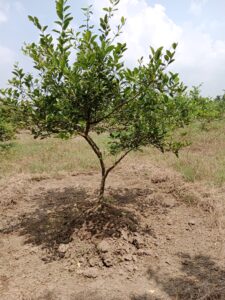
A general guideline is to fertilize during periods of active growth, which typically aligns with spring and summer for healthy lemon trees, as well as for most other plants. It’s advisable to avoid fertilizing your lemon tree throughout the winter months.
Timing is critical. It’s best to refrain from activities like fertilizing and pruning during its inactive phases, such as in winter. While a young tree can be fertilized every 2-3 months during its dormant period, mature citrus trees should only receive fertilizer during spring and summer.
Balancing the timing and frequency of fertilization according to the tree’s growth stages and needs will promote healthy growth and robust fruit production in your lemon tree.
Usually, three times a year, citrus is fertilized.
Late February
For healthy lemon trees, fertilizer should be applied in late February or early March. Use a well-balanced fertilizer with equal parts nitrogen, phosphorous, and potassium when fertilizing older trees. Apply fertilizer evenly along the drip line of the tree, taking care not to come into direct contact with the trunk. After applying nutrients, make sure the area is well-irrigated to aid in their absorption into the soil.
June
Additional support for fruit development may come from a second application in late spring or early summer. In lemon trees, regular fertilizing encourages robust growth, blossoming, and abundant fruit output.
October
October is when the third fertilizer application is recommended to take place.
Avoid fertilizing during the dormant phase, typically in winter. The tree’s reduced metabolic activity means it won’t effectively utilize nutrients during this time.
How to Apply Lemon Tree Fertilizer?
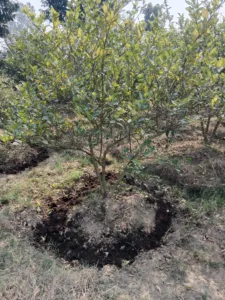
Successful fruit growing requires knowing how to fertilize a lemon tree correctly. When fertilizing a tree, you should make a circle that is the same width as the tree’s height and matches the size of the canopy.
A common error made by beginners is to fertilize lemon trees only near the base, which prevents the fertilizer from reaching the roots. For example, if the tree is three feet tall, apply fertilizer in the form of a three-foot-diameter circle.
Applying fertilizer in a 6-meter circle around your 6-meter-tall lemon tree is part of the fertilization process. This process guarantees that all the root systems will receive adequate nutrient supply. Growing healthy lemon trees in your garden can be very fulfilling; learning how to fertilize and cultivate them will increase the likelihood that you will get bright yellow lemons.
Fertilizer application in a circular pattern proportional to the tree’s height ensures nutrient absorption throughout the entire root system, aiding healthy lemon growth.
FAQs
Q1. Where do lemon trees grow best?
Lemon trees grow well in regions of tropical to subtropical climates, where they have warm temperatures, plenty of sunlight, and well-drained soil. Ideally, lemon trees grow best in areas with temperatures between 21 to 38°C during the day and not dropping below 13°C at night. They are sensitive to frost, so areas with minimal frost risk are preferable. Well-drained, slightly acidic to neutral soil is ideal for lemon trees.
Q2. Why is my lemon tree losing leaves?
Lemon trees are losing leaves because of the following reasons.
- Overwatering or underwatering.
- Lack of essential nutrients.
- Insect or disease infestation.
- Improper pruning.
- Environmental stress.
- Natural leaf shedding.
- Transplant shock.
Q3.Why are my lemon tree leaves turning yellow?
Following reasons:
- Lack of essential nutrients like nitrogen or magnesium.
- Poor drainage facility.
- Overwatering or underwatering.
- Disease infestation (Citrus canker & Tree gummosis)
- Insect infestation (Citrus leaf minor & Lemon butterfly)
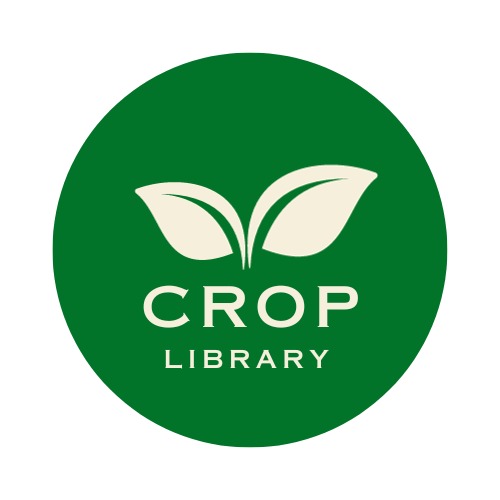
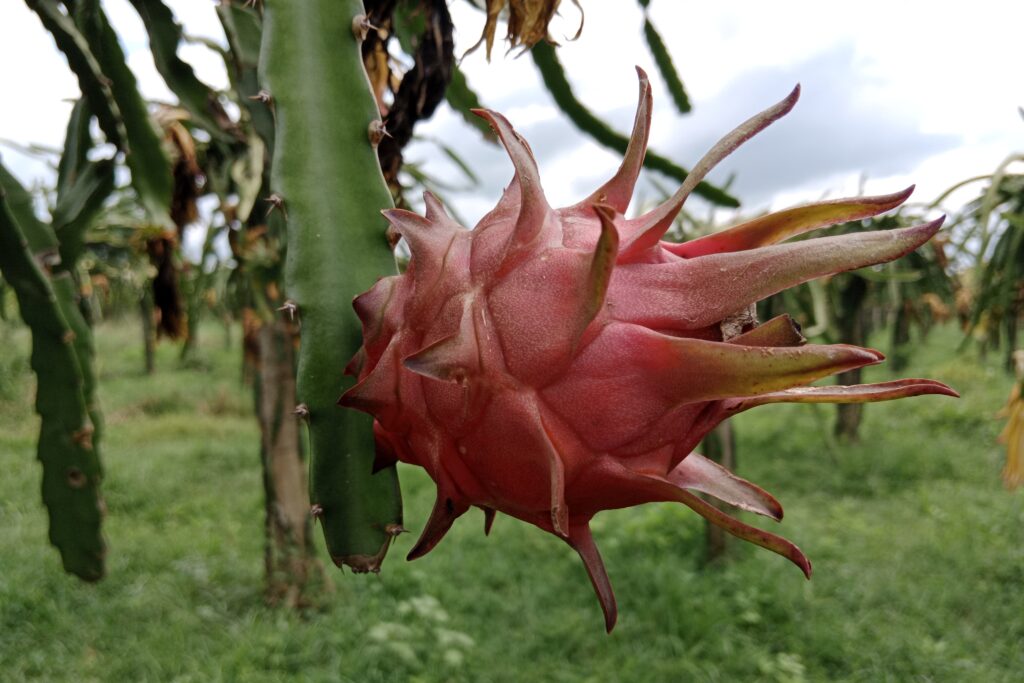
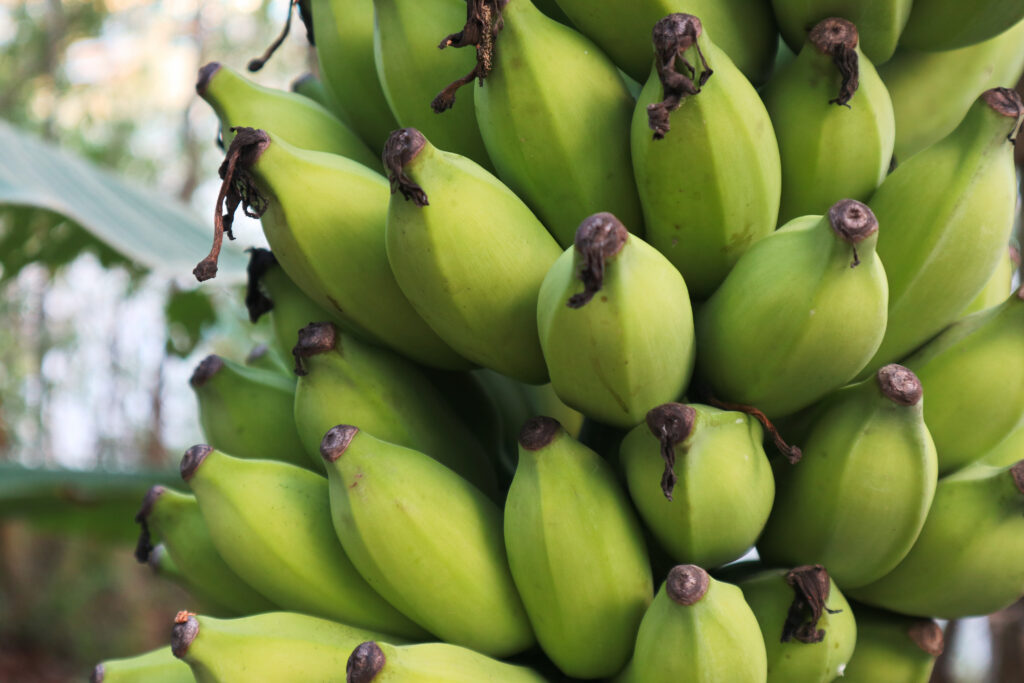
Pingback: How to Grow Lemon Trees from Grafted Seedlings: A Step-by-Step Guide -
Pingback: 8 Colossal Citrus Pests and Diseases